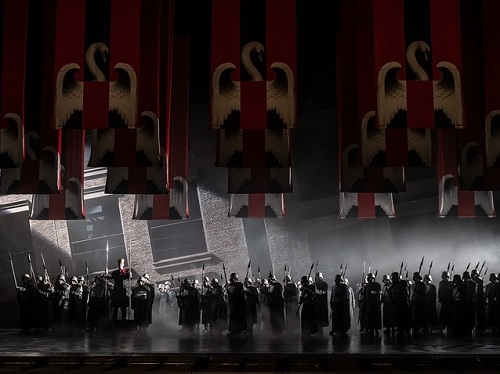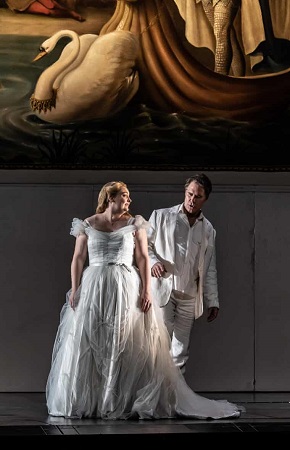Considering the first night of David Alden’s (then) new production of Lohengrin in 2018, I found ‘a conceptual weakness at … [its] heart. I suspect it can be remedied: if a shell, it is a fine shell. It will not, however, remedy itself.’ Rather to my surprise, I found this first revival, notably under a new director, Peter Relton, much stronger. It is not always easy to be sure what has actually changed, and what one is viewing differently for oneself. I shall not try; the earlier review remains for anyone who wishes to read it. In at least partial recantation, then, I am happy to say this made for a far more satisfying evening, dramatically and musically, than that experienced four years ago. Moreover, for Wagner to have returned so emphatically to one of the city’s main houses marked a step-change in London’s operatic recovery. However much one wished it to succeed, ENO’s autumn Walküre proved a bitter disappointment. If Lohengrin did not quite match the success of Covent Garden’s astonishing recent Peter Grimes, it stood closer to that than to November’s dispiriting evening at the Coliseum.
An interwar fascist regime, on the verge at least of further war, is the setting (albeit with certain irritating Alden anachronisms of the sort that conceive postmodernism as style rather than philosophy). The aftermath of war, presumably the Great War, that haunts the first act in particular, every character seemingly damaged, mentally and often physically too. The charge of war and of preparations for another has obvious resonances to spring 2022; they could hardly fail to speak. If King Henry cowers like a question mark—in his throne, with crown, he seems an all-too-obvious rip off from Hans Neuenfels at Bayreuth—and the Herald wears his injuries anything but lightly, others struggle to stand too. Telramund and Elsa act and react in caricatured expressionist style. Even Lohengrin adopts a foetal position of comfort with Elsa, presumably seeking a mother figure lacking in the Grail brotherhood. (As Nietzsche did not say, let us not go there.)

Only Ortrud, doubtless significantly, operates as normal. Perhaps it is her ‘magic’, or perhaps that magic is a metaphor for something broader; that is really up to us. A fine touch, at the close of the second act, is her apparition in a box, toasting (cursing) with champagne the unhappy couple. Hemmed in by Paul Steinberg’s sets, their crossings and their disjunctures a striking visualisation of catastrophe, the action is never likely to end happily. This, after all, is a tragedy, probably the purest in Wagner; a signal strength here is that we do not forget that. That is not, of course, to say that it always need be played exclusively as such, but there is an ultimate trajectory here less in evidence than last time, which certainly strengthens the drama in this context.
So too did Jakub Hrůša’s conducting of the Orchestra of the Royal Opera House—and the golden orchestral playing itself. Hrůša is not afraid to take his time, the first act feeling especially broad, though never merely slow. Careful attention to detail and to its place in the whole had Wagner’s score veritably glow with inner life. The old operatic forms on which much of Wagner’s conception is ultimately based were clear. In Mein Leben, Wagner recalls Schumann’s puzzlement at a Dresden reading of the poem; he ‘liked it, yet couldn’t figure out the musical form I had in mind for it, as he couldn’t find any passages suitable for traditional musical numbers. I then had some fun reading him different parts of my poem just as if they were in aria and cavatina form, so that in the end he smilingly conceded the point.’ Full performance can heighten that sense further—yet also more dialectically. For equally clear were the development of those forms and the forces energising that development: harmony (especially that of Ortrud), of course, but also an energised conception of Gluckian accompagnato arising from Wagner’s work as conductor, editor, and director.

At any rate, not only did Hrůša show a fine Wagnerian’s ability to hear vast structures—acts, at least—in a single breath, but he inspired the finest playing from all sections of the orchestra throughout. Each act had its own way of unfolding; no one-size-fits-all approach, but rather a patient, powerful strategic ear and mind. Moreover, he often favoured—unfashionably—long, quasi-vocal orchestral lines: not so much Straussian as with kinship to the Wagner of a conductor such as Karajan. The vertical was not ignored, but experience suggested ultimately a more horizontal conception of Wagner’s—‘endless melody’, perhaps—and convincingly so.
Brandon Jovanovich offered a finely judged portrayal of Lohengrin, as acute in verbal as musical terms, its clarion heroism shielding—and sometimes not—a vulnerable and decidedly ambiguous inner core. Craig Colclough’s Telramund, tragically in thrall to Anna Smirnova’s sensational Ortrud, presented similar ambiguities, those similarities engaging sympathy and our appreciation of dramatic complexity. If there was something winningly ‘old-school’ to Smirnova’s vocal delivery and sheer star presence, that was not at the cost of more ‘modern’ engagement with directorial concept, far from it. Jennifer Davis’s movingly human Elsa grew in stature throughout a committed performance. Gábor Bretz vividly captured the King’s instability. Derek Welton made for an uncommonly vivid Herald, hinting intriguingly at psychological complications from a wartime past.
Last but far from least, William Spaulding’s Royal Opera Chorus sounded on as fine form as I can recall for some time. How welcome, moreover, it was to have a large chorus seemingly unrestricted—reality may have been different—by pandemic restrictions in what it could do and, above all, how it could sing. Ultimately, then, it was that crucial, yet often elusive, sense of a dramatic whole that served to distinguish revival from first incarnation.
Mark Berry
King Henry the Fowler – Gábor Bretz, Lohengrin – Brandon Jovanovich, Elsa – Jennifer Davis, Friedrich von Telramund – Craig Colclough, Ortrud – Anna Smirnova, King’s Herald – Derek Welton, Brabantian Nobles (‘Four Followers of Telramund’) – Elgan Llŷr Thomas, Thando Mjandana, Matthew Durkan, Thomas D. Hopkinson, Pages (‘Four Women at the Wedding’) – Katy Batho, Deborah Peake-Jones, Renata Skarelyte, Louise Armit, Gottfried –Alfie Davis; Director – David Alden, Revival Director – Peter Relton, Conductor – Jakub Hrůša, Set Designs – Paul Steinberg, Costumes – Gideon Davey, Lighting – Adam Silverman, Video – Tal Rosner, Movement – Maxine Braham, Chorus and Orchestra of the Royal Opera (chorus director, William Spaulding).
Royal Opera House, London; Sunday 25th April 2022.
ABOVE: Lohengrin at the Royal Opera House (c) ROH/Clive Barda